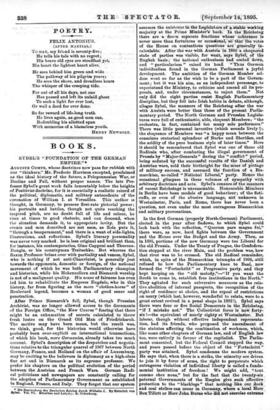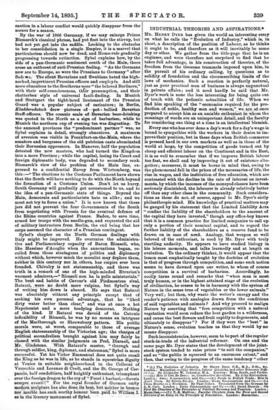BOOKS.
SYBEL'S " FOUNDATION OF THE GERMAN EMPIRE."
AUGUSTE COMTE, whose doctrines now pass for rubbish with our "thinkers," Mr. Frederic Harrison excepted, proclaimed as the ideal history of the future, a Peloponnesian War, or Decline and Fall, without proper names. The late Pro- fessor Sybel's great work falls lamentably below the heights of Positivist doctrine, for it is essentially a realistic record of the political, diplomatic, and military antecedents of the coronation of 'William I. at Versailles. This author is thought, in Germany, to possess first-rate pictorial power; his portraits and battles, though not quite reaching the inspired pitch, are no doubt full of life and colour, he rises at times to good rhetoric, and can descend, when the situation demands it, to appropriate levity. But the events and men described are not seen, as Zola puts it, "through a temperament," and there is a want of side-lights, illustrations, and reflections. Sybel's literary personality was never very marked . he is less original and brilliant than, for instance, his contemporaries, Gino Capponi and Thureau- Dangin, or his countryman Treitschke. But whereas the Saxon Professor brims over with partiality and venom, Sybel, who is nothing if not anti-Chauvinist, is generally just towards the opponents, domestic or foreign, of the national movement of which he was both Parliamentary champion and historian, while his Hohenzollern and Bismarck worship is not of a malignant quality. His sense of fairness has even led him to rehabilitate the Empress Eugenie, who in this history, far from figuring as the mere "clothes-horse" of Boulevard legend, becomes a woman of good sense and penetration.
After Prince Bismarck's fall, Sybel, though Prussian Archivist, was no longer allowed access to the documents of the Foreign Office, "the New Course " fearing that there might be an exhumation of secrets calculated to throw fresh lustre on the Grand Old Man of Friedrichsruh. The motive may have been mean, but the result was, we think, good, for the historian would otherwise have probably been over-explicit on international transactions, of which his book, more Germamico, already takes too much account. Sybel's description of the despatches and negotia- tions relative to the triangular quarrel of 1867 between North Germany, France, and Holland on the affair of Luxemburg, may be exciting to the believers in diplomacy as a high-class fine art and in Bismarck as its supreme professor. We prefer his chapters on the political evolution of the period between the Austrian and French Wars. German Radi- cal politicians and newspapers are constantly calling for the adoption of Parliamentary Government as established in England, France, and Italy. They forget that our system • NO Begriindung dee Deutechen Reiches durch Wilhelm I, By Heinrich von Sybel. Vol. VI. hithicben and Leir 21.; R. Oldenburg.
assumes the existence in the Legislature of a stable working majority at the Prime Minister's back. In the Reichstag there are a dozen separate fractions whose coherence is never more than fortuitous or occasional, so that the votes of the House on contentions questions are generally in- calculable. After the war with Austria in 1866 a chequered state of parties was visible, for want, says Sybel, of the English basis ; the national enthusiasm had cooled down, and " particularism " raised its head. " Thus German individualism found in the German Parliament a joyful development. The ambition of the German Member sel- dom went so far as the wish to be a part of the Govern- ment ; but it was his aim, as an independent personage, to superintend the Ministry, to criticise and amend all its pro- posals, and, under circumstances, to reject them." Not only did the eight parties resist English Parliamentary discipline, but they fell into Irish habits in debate, although, alleges Sybel, the manners of the Reichstag after the war with Austria were better than those of the present Parlia- mentary period. The North German and Prussian Legisla- tures were full of enthusiastic, able, eloquent Members; " the orchestra, in fact, contained too many solo performers." There was little personal invective (which sounds lively !); the eloquence of Members was " a happy mean between the conscious oratorical splendour of Burke and Sheridan, and the aridity of the pure business style of later times." Here it should be remembered that Sybel was one of those old Radicals who, after combating the illegal government of Prussia by "Major-Generals" during the " conflict" period, being seduced by the successful results of the Danish and Austrian wars, sold their birthright for the mess of pottage of military success, and assumed the function of a Bis- marckian, so-called " National Liberal," party. Hence the occasional glimpses in these volumes of sympathy with arbitrary doctrines and acts. Sybel's censure of the manners of recent Reichstags is unreasonable. Honourable Members in Berlin have been models of good behaviour; of the fisti- cuffs, or even of the abusive language, not unknown in Westminster, Paris, and Rome, there has never been a question, not even under the most outrageous Bismarckian and military provocations.
In the first German (properly North-German) Parliament, elected in the year after Sadowa, to which Sybel could look back with the reflection, " Quorum pars magna fui," there were, as now, hard fights between the Government and the House over the Budget and the Army. Then, as in 1895, portions of the new Germany were too Liberal for the old Prussia. Under the Treaty of Prague, the Confedera- tion stopped at the river Main, and the problem was, how that river was to be crossed. The old Radical remainder, which, in spite of the Bismarckian triumphs of 1866, still refused to bow the Parliamentary knee to Baal, now formed the "Fortschritt" or Progressive party, and they kept harping on the " old melody,"—" If you want the South to come in, establish free institutions in the North." They agitated for such subversive measures as the rela- tive abolition of internal passports, the recognition of the right of residence at choice, and the repeal of restrictions on usury (which last, however, wonderful to relate, were to a great extent revived in a penal shape in 1892 !). Sybel says there were four or five Social Democrats in the Reichstag, "if I mistake not." The Collectivist force is now forty- six !—the equivalent of nearly eighty at Westminster. But labour, though without effective independent representa- tion, had its friends, who proposed the amendment of the statutes affecting the combination of workmen, which, like some other chapters of German law, and of English law too, were entirely in favour of the capitalist. The Parlia- ment consented, but the Federal Council stopped the way, and years passed before the object of the "Fortschritt" party was attained. Sybel condemns the modern system. He says that, when there is a strike, the minority are driven to join it by force of arms, the right to perpetrate which outrageous violation of individual liberty is called a funda- mental institution of freedom ! We might add, " tout comme chez noes," but for the fact that the twenty-six paternal Governments of the Empire give such effective protection to the " blacklegs " that nothing like our dock and coal strikes can occur in Germany, where a local Herr Ben Tillett or Herr John Burns who did not exercise extreme
caution in a labour conflict would quickly disappear from the scenes for a season.
By the war of 1866 Germany, if we may enlarge Prince Bismarck's classical phrase, had put foot into the stirrup, but had not yet got into the saddle. Looking to the obstacles to her consolidation in a single Empire, it is a marvel that particularism should now be dead, and Home-rule gradually progressing towards extinction. Sybel explains how, by the side of a pan-Germanic sentiment south of the Main, there arose an outburst of anti-Prussian feeling. "As the Germans now are to Europe, so were the Prussians to Germany" after Sadcwa. The silent Bavarians and Swabians hated the high- necked, impertinent Prussian officers and employ& And still more obnoxious to the Southern were " the beloved Berliners," with their self-consciousness, thtir presumption, and their chatterbox style of universal fault-finding. In Munich and Stuttgart the tight-laced lieutenant of the Prussian Guard was a popular subject of caricature; in Berlin, .Klacideradatsch drew pictures of pot"- bellied Bavarian Staff-officers. The oceanic scale of Bavarian beer-drinking was quoted in the North as a sign of barbarism, while to Munich the northern cup of evening tea was disgusting. To the annexed provinces the "predominant partner" was, as Sybel explains in detail, strongly obnoxious. A maximum of aversion was visible in Frankfurt-on-the-Main, where the senators and burgesses of the old patrician caste abominated their Borussian oppressors. In Hanover,• half the population detested the new masters, who had turned the Kingdom into a mere Province;- while the capital, losing its Court and foreign diplomatic body, was degraded to secondary rank. Bismarck's view of the problem of the Main line, ex- pressed to a confidential Envoy from Wiirtemberg, was this :—" The elections to the Customs Parliament have shown that the South will have nothing to do with the North beyond the formation of a Customs Union. Don't let us burry. South Germany will gradually get accustomed to us, and to the idea of a pan-Germanic state of things. Beyond the Main, democrats and particularists hate us alike ; and we must not try to force a union." It is now known that these jars did not prevent the four Governments of the South from negotiating with Prussia for the eventual defence of the Rhine countries against France. Baden, to save time, armed her troops with the needle-gun, and requested the aid of military instructors from Berlin, the end being that her corps assumed the character of a Prussian contingent.
Sybel's chapter on the North German dealings with Italy might be improved. He overrates the administra- tive and Parliamentary capacity of Baron Ricasoli, who, like Massimo d'Azeglio when the annexations began, re- coiled from those stratagems of politics and diplomacy without which, however much the moralist may deplore them, neither in this century nor in others, has empire ever been founded. Chivalry is not statesmanship, and there was truth in a remark of one of the high-minded Etrurian's warmest admirers,—" Ricasoli non ha la pelle ministeriale." The bent and habits of Cavour's old Piedmontese rival, Ratazzi, were no doubt more vulpine, but Sybel's way of writing him down is absurd. He says that Ratazzi was absolutely without any principle except that of seeking his own personal advantage, that he " liked dirty water better than clear," and was at once a hot Napoleonist and a mere toadying democrat. Nothing of the kind. If Ratazzi was devoid of the Catonic inflexibility of Ricasoli, he was by no means an intriguer of the Marlborough or Shrewsbury pattern. His public morals were, at worst, comparable to those of average English statesmanship of the Victorian age; the charges of political scoundrelism brought against him may fairly be classed with the similar judgments on Peel, Disraeli, and Mr. Gladstone. With Ratazzi's master, " through and through soldier, king, diplomat, and statesman," Sybel is more successful. Yet his Victor Emmanuel does not quite recall the King as he was in life, as he stands in equestrian dignity at Venice in suitable neighbourhood to the Colleoni of Verocchio and Lorenzo di Credi, and the St. George of Car- paccio, half condottiere, half knightly enthusiast, triumphant over the foreign dragon to the cry of " Fuori i barbari,—Savoia sempre avanti!" For the royal founder of German unity modern sculpture has also done its best, but neither in bronze nor marble has such_ worthy honour been paid to William I. as in the literary monument of Sybel.



































 Previous page
Previous page